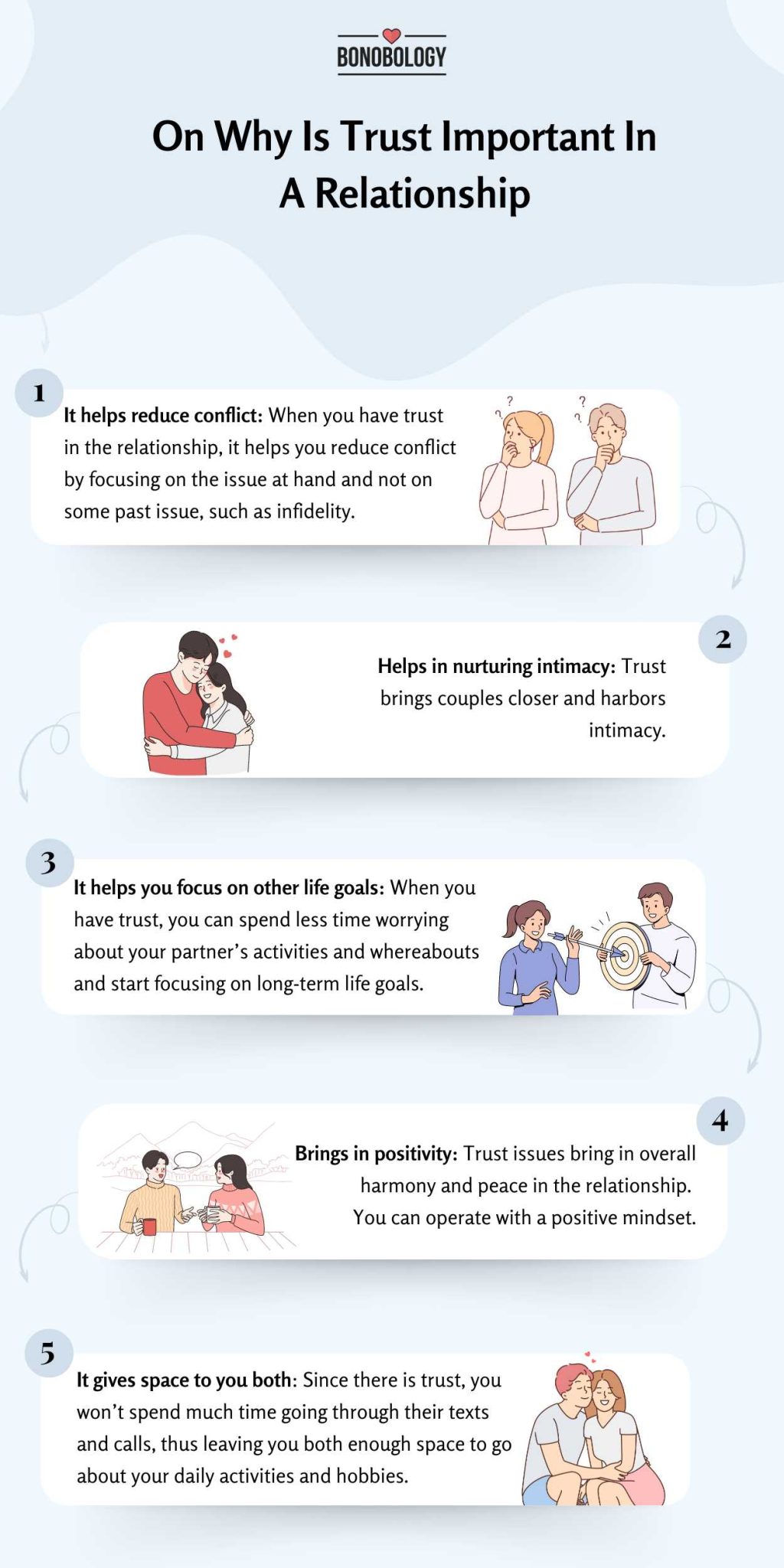As Ernest Hemingway said, “The best way to find out if you can trust somebody is to trust them.” But is it really that easy to trust people, especially if you’ve been betrayed in the past? Trust doesn’t come that easy. It takes a lot of tears, arguments, and silence between couples to get to a level of trust that is unshakeable. There can be times when you may find yourself frustrated with your love life while figuring out how to get over trust issues.
In this article, we’ll give you a low-down on trust issues and how they can affect your relationship, with the help of expert insights from California-based psychiatrist and cognitive behavior therapist Dr. Shefali Batra (MD in Psychiatry), who specializes in counseling for separation and divorce, breakup and dating, and premarital compatibility issues.
What Are Trust Issues?
Before we go any further, let us first look into the trust issues meaning. Is it just confusion over whether your partner is being honest or if there is transparency in your relationship? Or a far more severe case of distrust that can ruin your bond? Dr. Batra says, “A trust issue is the inability to place faith in your partner that they are being honest with you, will be there for you, and will be loyal to you at the dire hour when you need them.” Trust issues can stem from a lot of things. All of these revolve around some activity or thought of your partner that puts you off or makes you alert.
Dr. Batra adds, “Trust issues meaning is not just about questioning their words or actions. It’s about feeling a constant undercurrent of anxiety and suspicion that past experiences can trigger, other people’s opinions or media, even when they are genuinely trying to be transparent.”
Types of trust issues
Before we get on with how to get over trust issues, let’s look at a few types of trust issues. Dr. Batra lists out a few such issues that may unsettle your mental peace or make you anxious:
Fear of infidelity
Picture this: you’re sitting across from your partner, discussing plans for the weekend. They mention they have a work trip coming up, but something feels off. You recall a story your friend narrated to you earlier that day regarding an unfortunate colleague of hers who got cheated on while her partner was on a so-called ‘work trip’. This casts a shadow of doubt over what your partner just said. This is a major trust issue related to fidelity.
Here’s what a reader shared with us: “I thought I met my soulmate when I met him. Things were very nice initially. I loved him with all my might. and I thought he loved me the same way. But he also turned out to be a cheat. He has another girlfriend who is his neighbor, and he always hid her from me. He wanted me to quit my job because he felt insecure about my office colleagues. We keep on doubting each other and haven’t been able to cope. It has made us both miserable, always questioning each other and always thinking the other is cheating.” You can read their complete story here.
Concerns about financial honesty
One of the types of trust issues involves fear of financial infidelity. This could come up when a partner is not too well-versed with finances and leaves it to the other. And more often than not, it’s women who are not so well-acquainted with money matters. A study has proved that women are still lagging behind men when it comes to financial literacy. However, after a while ignorance does not seem like bliss anymore and one suddenly feels that the other might dupe them of finances. This feeling intensifies more so when other issues are cropping into the relationship.
Insecurity
Can you love someone and not trust them? Trust is the foundation of any relationship, especially romantic relationships. Without it, every explanation or commitment from your partner can feel like a potential betrayal. Building trust and transparency in relationships takes time and patience. One type of trust issue that can plague the initial stages of the relationship is the issue of friendships.
If you find your potential partner/love interest spending time with a lot of friends of the opposite gender (or the gender they fancy), or texting/calling them throughout the day, you are bound to be suspicious of their activities behind your back. It may not directly amount to infidelity, but your partner may divulge your secrets to their friends.
Revelation of secrets
Trust issues regarding the revelation of secrets can ruin relationships too. For instance, a friend of mine, Ashley, trusted her husband with all her secrets. She even told him about her past affairs. But when his sister-in-law once made a jibe at her, mentioning how many affairs she had had before marriage, Ashley started to realize she couldn’t trust her husband with her secrets. She realized her husband’s family connections probably knew all her secrets now. This caused her deep anxiety, as she felt her secrets could now go out in public, among her neighbors too.
Bad habits and addictions
Trust can be hampered by some bad habits of your partner, which can lead to other issues, such as infidelity or financial loss. For instance, your partner may be into gambling or may be addicted to drugs or alcohol. They may be lying to you often about their whereabouts, in that case, just to hide what they’re doing, to avoid conflict. And if you ever find this out, you are bound to not trust them again. The same goes for habits such as stalking women online and texting or flirting with them too. Trust once lost, in such cases, can hardly get back on track.
What Causes Trust Issues?
You might find yourself questioning why you have such deep-seated trust issues in your romantic relationships. Trust issues don’t just appear out of the blue. There are quite a few concerns that may cause trust issues. Dr. Batra talks about a case she dealt with: “I recall the case of a couple wherein the woman, Angela, was an aspiring model while her husband, John, ran a video game parlor. Clearly, the mistrust was from John’s side, wherein he was uncomfortable about her participating in photo shoots, ads, and short movies.
“He was worried about her proximity to other men and was increasingly anxious and uncomfortable. He said that he trusted her to not cheat on him, but the obsessive thoughts that she possibly could, did not stop haunting him and it was affecting the relationship deeply.” So, you see, a lack of trust in relationships can be immensely detrimental. But in order to get to how to get over trust issues, you need to get to the depth of the reasons behind such issues. Here’s what causes trust issues, according to Dr. Batra:
1. Your partner lets you down
Well, imagine this: you’ve been in relationships where your partners promised to always be there for you. Yet, they consistently let you down during crucial moments. Here are some instances:
- They canceled plans last minute to spend time with friends
- They ‘forgot’ they made plans with you
- They couldn’t make it when you had to admit your mom to the hospital
Dr. Batra says, “Each time something like this happens, their actions shatter your expectations and leave you feeling betrayed and insecure.”
2. Emotional manipulation
Dr. Batra cites one more such instance: “Perhaps you’ve been in situations where you opened up to your partner about your deepest fears or dreams, only to have them use that information against you in an argument later.” This amounts to emotional manipulation, which can deeply scar your ability to trust in intimate relationships.
3. Betrayal
If you don’t know how to trust your partner, betrayal could be one of the reasons for it. So, what happens when you find out your partner has been doing something behind your back without telling you, knowing that their actions could ruin your relationship for good?
Well, to begin with, the shock of discovering betrayal in a relationship can shatter your trust in not only your partner but in future relationships too. Betrayal comes in many forms. Trust issues can stem from the following forms of betrayal:
- Financial dishonesty: Imagine discovering that your partner has been hiding significant debts or making major financial decisions without your knowledge
- Emotional neglect: Your partner may also promise to be there in times of need, only to disappear when you need them the most
- Talking to an ex behind your back: Your partner may have promised to always be faithful and loyal. But you discovered they were secretly communicating with an ex behind your back

4. Habitual disappointment or past trauma
Dr. Batra says, “Trust issues often develop from repeated instances of disappointment and betrayal in romantic relationships. Each hurtful experience builds walls around your heart, making it increasingly difficult to let others in or to believe in the sincerity of their words and actions. Over time, you may find yourself instinctively bracing for the worst, fearing that vulnerability will only lead to further pain.” The more you come across people who’ve let you down or betrayed you in the past, the more intense your trust issues get.
How To Overcome Trust Issues In A Relationship: 9 Therapist-Recommended Tips
Dr. Batra says, “Healing from trust issues requires addressing these past hurts directly, fostering open communication, and rebuilding a sense of security and reliability with yourself and your partner.” Here’s how she tried helping the couple (previously mentioned in the article) to get rid of their trust issues. She says, “I took on Angela’s case with a structured 8-week Couples Cognitive Behavior Therapy. I gave them specific tasks. For instance, they needed to speak to each other 2 to 3 times a day to exchange notes about how they felt, how their day was going, and what they might like to do with each other at night when they got home.
“Once in a while, I suggested that she could call him for the photo shoot if she had the time and inclination. I gave them tips and strategies to keep the spark of their relationship alive. She reaffirmed that business was pure business. This clarity, honesty and openness, and expression of worry and apprehension, helped ease the anxiety. They also planned activities like pottery, painting, and cooking together at the end of the day on several days. Very soon the mistrust died down.” Likewise, Dr. Batra here enumerates 9 such tips, in case you’re wondering how to overcome trust issues in a relationship:
1. Don’t let your partner’s online behavior consume you
Dr. Batra says, “You should not let your partner’s actions on social media, chat apps, or the internet consume you or govern your actions. Even if you don’t trust them completely, sort things out by talking and not by reacting instantly.” For instance, this is how can bring back some trust:
- Realize real relationships have ups and downs. Stop comparing your relationship to unrealistic portrayals of relationships on social media. Own your differences and conflicts
- Stop getting paranoid over the tons of options your bae can have on social media. Remember that they chose you for a reason, and they may not let you go just because of some flimsy options on social media
- Stop checking your partner’s phones or ask them for their social media passwords. Try having an open conversation instead
2. Set boundaries and maintain healthy privacy
In case you’re wondering how to overcome trust issues in a relationship, well, remember, boundaries are of paramount importance in maintaining trust. Dr. Batra says, “Establishing boundaries around privacy can build trust.” For instance, discuss what information is okay to share with friends and family. If you’ve been hurt by a partner sharing personal details without your consent, openly communicating your boundaries in the relationship can prevent future misunderstandings and build a sense of security.
3. Make peace with your past
Wondering how to trust your partner completely? Don’t let your past relationships hamper your present. Dr. Batra advises, “Confront your past experiences. For instance, if a previous partner cheated on you, addressing how it affects your current relationship can prevent you from unjustly accusing your current partner.” This is one of the best ways if you’re clueless about how to get over trust issues.
Therapy or self-reflection is needed to help you process these emotions and prevent them from wrecking your current relationship. This is the best way if you’re clueless about how to get over trust issues.
4. Set your relationship goals
Setting relationship goals is the best way if you’re wondering how to get over trust issues. That’s because goals help you align your paths and work together as a team. Dr. Batra says, “You need to have clear goals about the future.” For example:
- Life goals: Discuss with your partner regarding where your relationship is heading and what both of you want in the long term
- Fidelity goals: If you’ve ever doubted your partner’s commitment in the past, discuss expectations and build mutual trust
- Financial goals: Set some tangible money goals too, such as who spends how much, which big purchases you need to discuss with each other, who contributes how much, etc. This negates the chance of financial distrust
5. Engage with your partner
If you’re often asking yourself how to trust your partner, well, indulge in open communication about your feelings. For instance, if you feel suspicious about your partner’s friendships, talk it out calmly and listen to their perspective to prevent misunderstandings. Dr. Batra says, “Regular communication fosters emotional intimacy and reduces unfounded suspicions.” This is one of the ways to address the ‘how to overcome trust issues in a relationship’ issue.
6. Be independent
This is one of the best ways to approach a situation where you’re clueless about how to get over trust issues. It’s important to have your own life, apart from your relationship. This independence can extend to:
- Having your own set of friends
- Cultivating your own hobbies
- Having your own finances
Dr. Batra explains, “Maintaining independence promotes trust and self-assurance. For instance, if you’ve felt dependent on a partner for validation or financial support in the past, cultivating individual interests and friendships can boost self-esteem. Having separate finances and personal space reinforces autonomy and reduces dependency-related problems.”
7. Stop projecting insecurities
Now, this is one of the best solutions to bring back trust in a relationship. Dr. Batra says, “Recognizing and addressing insecurities prevents projecting them onto your partner. For example, if you have been lied to by a previous partner, and your current partner mentions having a work event that runs late, you might find yourself imagining scenarios where they are flirting with someone else instead of working.” Such projections of insecurity can lead to:
- Constantly questioning them
- Checking their phone for messages or calls
- Accusing them without any hard evidence
8. Keep the romantic spark alive
Dr. Batra says, “Maintaining physical and emotional intimacy strengthens trust. For example, if you’ve struggled with feeling disconnected from your partner, prioritizing date nights or shared activities can rekindle closeness.” Here are some more tips on how to let someone in without distrust:
- Make small gestures of affection and appreciation, such as a handwritten note or a thank-you card. They reinforce emotional bonds and build mutual trust over time
- Treat your relationship like a rom-com, with cute surprises and dinner dates
- Spice it up in bed. Take a mid-week leave from work and cuddle and make love the entire day
9. Speak to a friend or a professional
This work wonders if you’re wondering how to let someone in, without distrust. When you start to develop a lack of trust, you cannot see things objectively. You begin to think catastrophically and may not be able to make the right judgment. Dr. Batra says, “In times such as these, you could speak to a senior family member, a friend, or a mental health professional.” Feel free to get in touch with Bonobology’s panel of licensed counselors.
This will help you look at things objectively and from a logical point of view. This is thus one of the best ways to bring back trust in a relationship. Don’t let mistrust hamper your relationship.
Infographic On Why Is Trust Important In A Relationship
Now that we know how trust issues hamper relationships, let’s get straight to why it’s such a sensitive topic. Why do you think maintaining trust is important in a relationship? Here’s a list of some of the reasons why:

Frequently Asked Questions
1. Why do I have trust issues?
You can have trust issues due to many factors, such as issues related to past trauma, betrayal, and emotional manipulation. You can also have trust issues when you end up being hurt due to your partner letting you down constantly.
2. Can trust issues ruin a relationship?
Yes, trust issues can ruin relationships for good. You may end up hurting an innocent person just because you don’t trust them. So, make sure you address the real issues that cause distrust in your relationship.
3. Is overthinking a lack of trust?
Overthinking can be caused by to lack of trust. For instance, you may end up suspecting your partner of having an affair with a coworker when they get back late from work. This has to be addressed by an open conversation and some third-party intervention.
Key Pointers
- You know you have trust issues in a relationship when you can’t have faith in your partner or are constantly in fear that they will betray you or leave you
- The many types of trust issues are issues related to fidelity, habits, and finances
- Trust issues can stem from your partner letting you down, emotional manipulation, betrayal, etc.
- Some tips on how to get over trust issues are: making peace with your past, setting boundaries, and engaging in open communication
- Why is trust important in a relationship? Simply because it reduces conflict, brings in positivity, and lets you focus on life goals
Final Thoughts
Can you love someone and not trust him/her? Well, not really, because trust is the main pillar on which a relationship balances itself. So, it is a ‘non-negotiable’ in all relationships and partnerships. And by now you know why trust is important in a relationship and how to get over trust issues. We hope you get over the distrust in your relationship and are not in doubt about how to overcome trust issues in a relationship. Go ahead and have that talk with your partner if their actions are bothering you.
Your contribution does not constitute a charitable donation. It will allow Bonobology to continue bringing you new and up-to-date information in our pursuit of helping anyone in the world to learn how to do anything.





